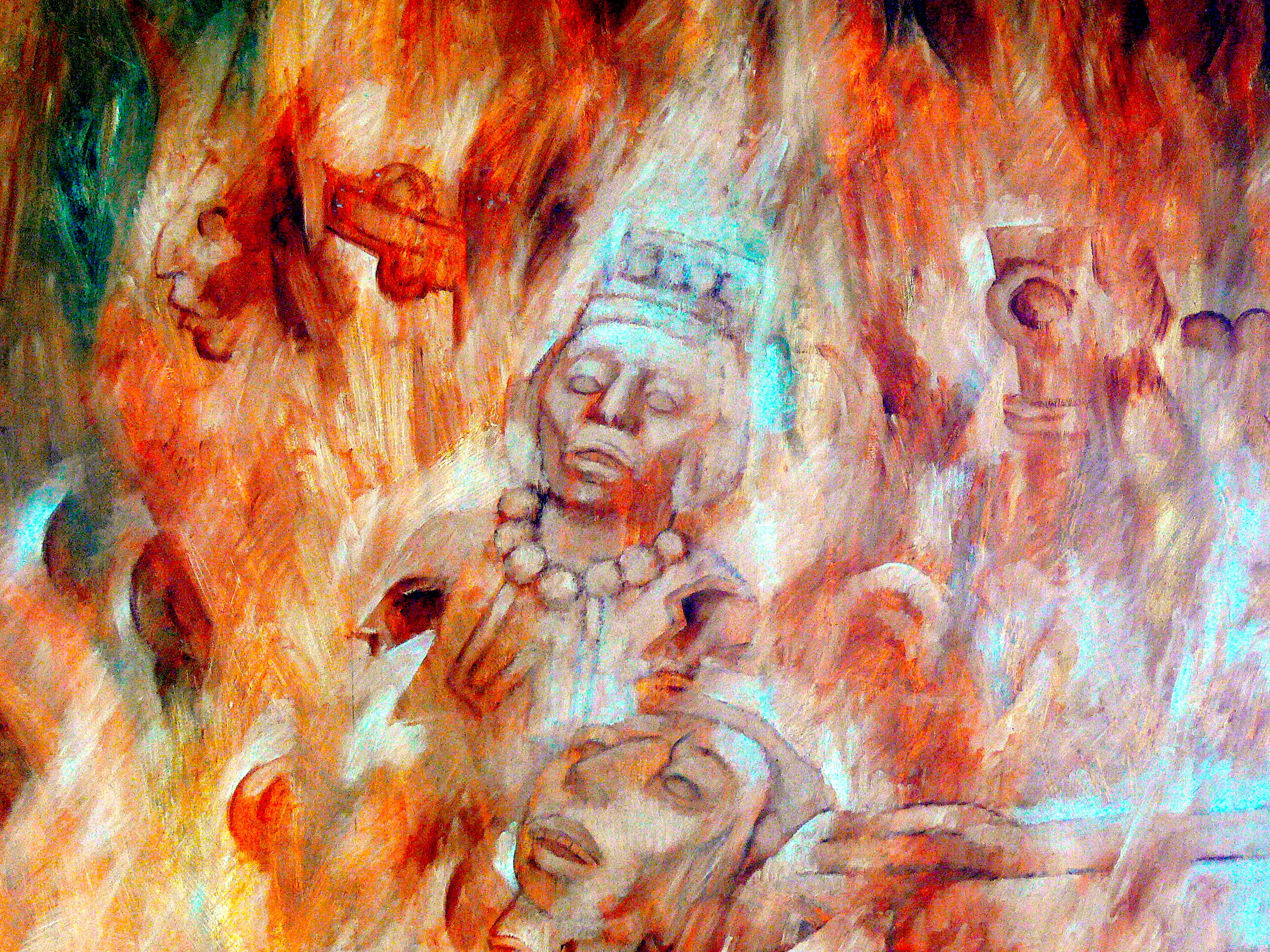Understanding climate change, writes Samantha Fox, means moving beyond the source of greenhouse gases and looking into the power relations that drive capitalist growth.

Detail from a mural by Fernando Castro Pacheco showing Spanish bishop Diego de Landa burning figures of Mayan deities. (Wolfgang Sauber, CC BY-SA 3.0, Wikimedia Commons)
By Samantha Fox
Common Dreams
 Too often climate change is reduced to quantification of greenhouse gases or melting ice caps. These indicators of climate change are important to verify the existence of the problem, but they are less constructive in helping us understand where the problem of climate change comes from.
Too often climate change is reduced to quantification of greenhouse gases or melting ice caps. These indicators of climate change are important to verify the existence of the problem, but they are less constructive in helping us understand where the problem of climate change comes from.
Understanding the source of climate change means moving beyond the source of GHGs and looking into the power relations that drive capitalist growth.
We know climate change because we have a science to understand it. Many people are familiar with the standard natural science narratives, narratives that are divorced from society. Fewer people are familiar with the social science explanations of climate change, even fewer still incorporate notions of power into the explanation. The first step to understanding climate change is understanding how power operates in the history of capitalist civilization.
Most climate change scholarship treats society as a black box or explains the problem as one of homogenous humanity. Take for example the idea of the Anthropocene [a proposed epoch that begins with the first significant impact of humanity on Earth ecosystems] where humanity is treated as something of a plague, entirely disconnected from nature.
In this line of thought, humanity itself is the problem. But this line of thinking ignores histories of power dynamics within humanity and between humanity and nature. It fails to acknowledge the contributions of the liberal arts to understanding power.
Anthropocene Line of Thought

“A Primate Studying the Anthropocene,” by Kelvin, Tsz Hei Choi. (imaggeo.egu.eu, Creative Commons)
The Anthropocene line of thought suffers from a capitalist ideology that reduces relations of power and production to simplistic human activities. The construction of humanity as distinct from nature allows such an idea as the Anthropocene to proliferate. In this understanding of the world, people are not animals nor are they part of ecological systems. Instead, a small part of humanity represented by European colonizers transmogrifies into the quintessential representation of humanity (as the culmination of evolutionary processes), dominating over nature as God on earth while those who have been colonized are ejected from historical consideration along with their decidedly not Anthropocene knowledge and management of nature.
William Cronon documents the changing relationship of European colonizers to nature in the historical expansion of what is today the United States. Cronon illustrates the ideological transformations that situated white men as a stand-in for God, dominating over nature and able to control nature through science, itself a socially constructed norm for objectivity.
The historical separation of a small segment of humanity from nature while simultaneously relegating that vast majority of humanity in an in-between state — neither sufficiently human nor sufficiently nature — means that today that more-or-less small segment of humanity controls the science and therefore how we conceptualize the problem of climate change. This conceptualization constructs humanity as the problem.

Portrait of Bartolomé de las Casas, principal defender of the Indians in the Junta of Valladolid; painter not identified. (Álvaro Huerga, Bartolomé de Las Casas: Vie et œuvres, Wikimedia Commons)
But humanity is not an undifferentiated whole. Only a small part of humanity, associated with Euro-colonizers, managed to colonize the world and dominate over an abstract nature that included the vast majority of its peoples. The reduction of most of the world’s populations into non-humanity or nature began with the debates at Valladolid in the 16th century.
It was during these debates that the indigenous peoples of the Americas were first identified as “savage” and in need of civilizing through Christianization. Said Christianization was used as a justification of land dispossession and occupation. Taking control of the land and enslaving (or virtually enslaving) the working classes served the purpose of extracting untold amounts of wealth for the colonizers.
Revisiting old sites of natural resource extraction as technological innovations capitalize on new resources such as lithium is a recurrent process that propels the capitalist world economy. The solution cannot lie exclusively in so-called sustainable technological innovation.
The economic imperative of accumulation and profit did not and does not operate independently of social processes. Not only was the material wealth extracted from nature that propelled capitalism forward largely lost in the 16th century, the knowledge of entire civilizations was intentionally destroyed and repressed.
The written Mayan language system was burned in Diego de Landa’s fires. Knowledge documented in the Incan quipu communication system was destroyed. What more was lost with the razing of entire civilizations in the Americas?
When you understand that more than half of the world’s humanity was deemed less than human and their civilization and cultural existence were erased from the historical record, it is difficult to comprehend the idea of the Anthropocene.
Serving a Purpose
Yet the Anthropocene argument serves a purpose. It allows the wealthier countries to eschew responsibility by imposing their will on the places and peoples their enterprises have underdeveloped. It allows people in power to focus political attention on shorter showers and abandoning plastic straws as solutions to climate change. This is despite the fact that the engine of capitalism is growth for the sake of growth.
As Edward Abbey wrote: growth for the sake of growth is the ideology of the cancer cell. Our planet cannot handle an eternal growth model. We live in a finite system and capitalist innovation can only take us so far. Eventually, we run out of resources. Climate appears to be the limit. This past year has seen the most extreme temperatures on record and extreme weather events are more common than ever.
Carbon dioxide levels, the primary measure of climate change, are the highest they have ever been measured. As climate expert Peter Gleick wrote on Twitter, the last time carbon levels were this high humans did not exist.
We need to cultivate in society an appreciation for dynamics of power in the relationship between capitalism and the rest of us, people and nature. There are insights to be gained from an understanding of how power factors in relations of humanity-in-nature throughout capitalist history. Social inequalities are environmental inequalities, those inequalities are an accumulation of wealth and privilege for a small number of people who benefit from a history of oppression. The wealthy need to better understand how sexism and racism operate as social structures in the same way they intuitively understand the economy. It takes more effort, but by learning about and addressing our personal role in inequalities we can realize a more just and equitable society which in turn will address climate change.
Climate change is an outcome of our current social organization. It threatens all of humanity. Altering our current social organization offers the possibility of creating a society-in-nature where all life is valued.
Samantha Fox is an assistant professor in the Department of Sociology and Anthropology at Ohio Wesleyan University.
This article is from Common Dreams.
The views expressed are solely those of the author and may or may not reflect those of Consortium News.

Alas, it seems to me that 99 out of a 100 articles on inequity and climate change really present no meaningful way forward. Is there really any government of any nation that isn’t driven to “grow the economy?” Some may be more egalitarian and concerned for the common good of their own citizenry, but even then it is easy enough to expose exploitation on multiple levels in their “supply chain.” (Consider every northern European country.) And consider the progressives that espouse the notion of creating millions of “green jobs” as a political slogan more than transformative conservation.
Perhaps the most absurd line in this particular article is, “The wealthy need to better understand how sexism and racism operate as social structures in the same way they intuitively understand the economy.” The wealthy/powerful understand these social structures perfectly. That is how they so completely are able to exploit them.
I am not a believer in “isms” as the problem or the solution. Capitalism, socialism, communism, may each have something to recommend them and just as many things to point out where they fall short when applied as a massive movement to control global power. While governments may offer solar tax credits, consider the tremendous efficiency gains in HVAC heat pumps, insulation technologies, energy efficient appliances and lighting. Do we have too many new homes that are too big? Certainly, but we are able to build well and efficiently and that is capitalism working well. I’m amazed at the progress in this regard in the last 20 years. Should we have a more equitable “socialized medicine model?” I would contend yes, but it also needs to recognize the damage done by processed food giants that are the path to chronic disease and life-long pharma dependency–capitalism working for profit over health.
Imagining a way forward must foster thrift, restraint, and local efforts with local care. The big solutions from government are inherently tied to power and are prone to promote one-size-fits-all answers without entertaining some of the most basic and critical questions. It is hard to be in a large city, disconnected from land, watersheds and forests, and understand how vital it is that we observe what these resources are telling us. The regenerative agriculture movement is doing well in educating farmers and ranchers to ask, “What is this place telling me?”
Regardless of who caused this catastrophe, it is here and now. If humans can’t even do a simple thing like get a FREE Covid vaccination because they think their rights are being infringed on (or whatever stupid excuse they might have), how the hell are we going to solve the predicament called Climate Change as a species? I say, so long Dodos – you deserve everything you get!
On Democracy Now Friday they discussed the 10 year anniversary of the Occupy Wall Street protests, and the guests were all so proud that it was such a successful event. I don’t agree at all. All of the systemic problems they were protesting have not been solved at all. And with respect to climate change it has become much, much worse in fact. The guests were happy that people go to protests now all the time. Big deal, the power elites couldn’t care less about protests. The rich are getting richer, the climate is getting worse and worse, and we can’t even agree to wear a mask and get vaccinated to end a pandemic. I think Occupy Wall Street accomplished nothing at all, and it’s sad, but I just don’t think protests do anything to change the dynamic and power structures at all.
In this otherwise excellent article I find that it has, by omission, not explained why capitalism has been able to do such damage to the planet compared to previous forms of class society – slavery and feudalism. Different forms of the modes of production. Societies also based on exploitation, both of the environment and nature, and of the production of the dispossessed or enslaved class.
The capitalist revolution in the mode of production and its profit motive – consumer society – allowed for the extraction, despoiling of the land and depletion resources on a scale never before experienced in human history by the revolution in technology and science.
That does not mean that earlier forms of civilisation did no damage to their environment. It all depended in the capacity to do harm.
Are we expected to believe that knowledge is gained a priori by people born ecologists and with reverence for their surroundings? Even in societies that did not know of the concept of exclusive right and appropriation [title to] of land and movable property as private ownership.
There are many cases where the source of food or capricious desire for the feathers’ of birds to decorate their being wiped out species. – or goat herding destroyed forests and vegetation and caused erosion. And in early ancient class civilization agricultural cultivation and irrigation – or lack of it – over time produced fields contaminated with salt – until nothing grew.
Then the wise men [women] or was it the laborers who first realized what was happening, without prior scientific understanding, that they had a produced unforeseen and unintended consequences. And as a consequence developed notions, either a consciousness of the cause or a conscious unaccountable mystery, attributed to a newly invented god, or gods, that they may have offended, having no other explanation of the failures of harvests, with a language still to be invented to account for the observation of their changed environment.
All I am saying – with no academic qualification – is there is such a thing as evolution, that transitions from one form of society to another and a consciousness of the damage we do, which becomes greater with the the evolution of our mode of production. How we produce things.
Each stage of development we find themselves in surroundings and circumstances that are given and adapt to their environment, and act on it in the course of production and reproduction – often blindly – and change the world. And in the struggle for survival develop notions and mores, mythical and real, imaginative and scientific that explain our world. It is an historically acquired consciousness, or awareness, called evolution.
And the damage we do – or don’t d0- is proportional to the revolution in science and technology we have invented which determines our thinking, knowledge and illusions about ourselves.
?
I believe that it was Ludwig Feuerbach who introduced the notion that man was also an animal in nature. Feuerbach declared that, in fact, humanity created the idea of god in its own image, instead of the other way around. Humanity did not stand outside of nature, it is a part of nature. Feuerbach was an influence on Karl Marx and Friedrich Engels.
In fact, regarding the separation of a small segment of humanity as “above” nature originated with Christianity, a vile belief that still holds humanity back from being fully human in the world.
After the US, the biggest contributor to global warming is China. Are the Chinese, per the author’s construct, European colonizers?
Almost all humans contribute to climate change. The Anthropocene may have been started by white guys in Europe, but it is worldwide now.
You don’t seem to have understood the article at all. Yes, most people contribute to climate change, but the disparities in emissions between, say, an Indigenous Peruvian and, say, the average reader of the New York Times or the Guardian are gigantic. The reasons for this disparity lie in capitalism. The solutions lie in socialism.